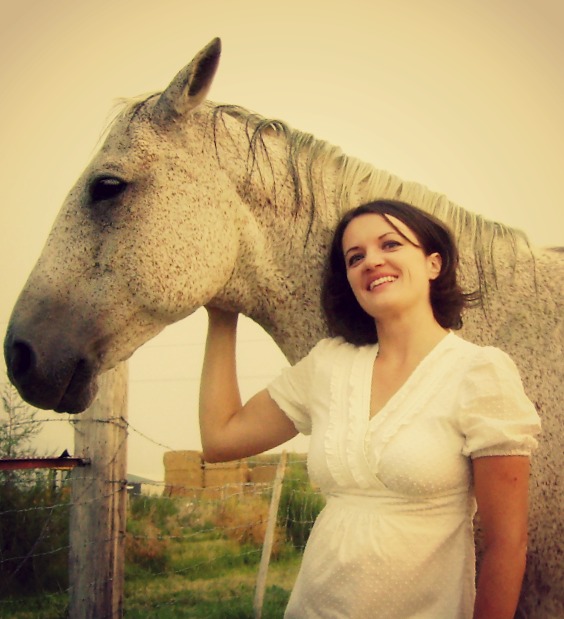 I lost my horse Rudy on the 3rd of January. He was almost twenty-eight years old, and ever since he came to live with us in October, I have worried about him. I knew he wasn’t going to live forever, but I had hoped for a few more years, especially now that we were reunited. I had mentally prepared myself for being with him during his last days, but it’s still such a sad reality that even the very best ones die.
I lost my horse Rudy on the 3rd of January. He was almost twenty-eight years old, and ever since he came to live with us in October, I have worried about him. I knew he wasn’t going to live forever, but I had hoped for a few more years, especially now that we were reunited. I had mentally prepared myself for being with him during his last days, but it’s still such a sad reality that even the very best ones die.
Rudy was born on our ranch in Nebraska when I was a just a kid. When I was about twelve, my dad offered me a horse of my own, and I chose Rudy, a bay-colored baby with a big white star on his face (he roaned out quickly as a yearling and was completely gray by age two). He was just two years old when I started training him by myself. I didn’t do the best job, of course, but Rudy put up with all of my mistakes and turned out pretty good in spite of me.
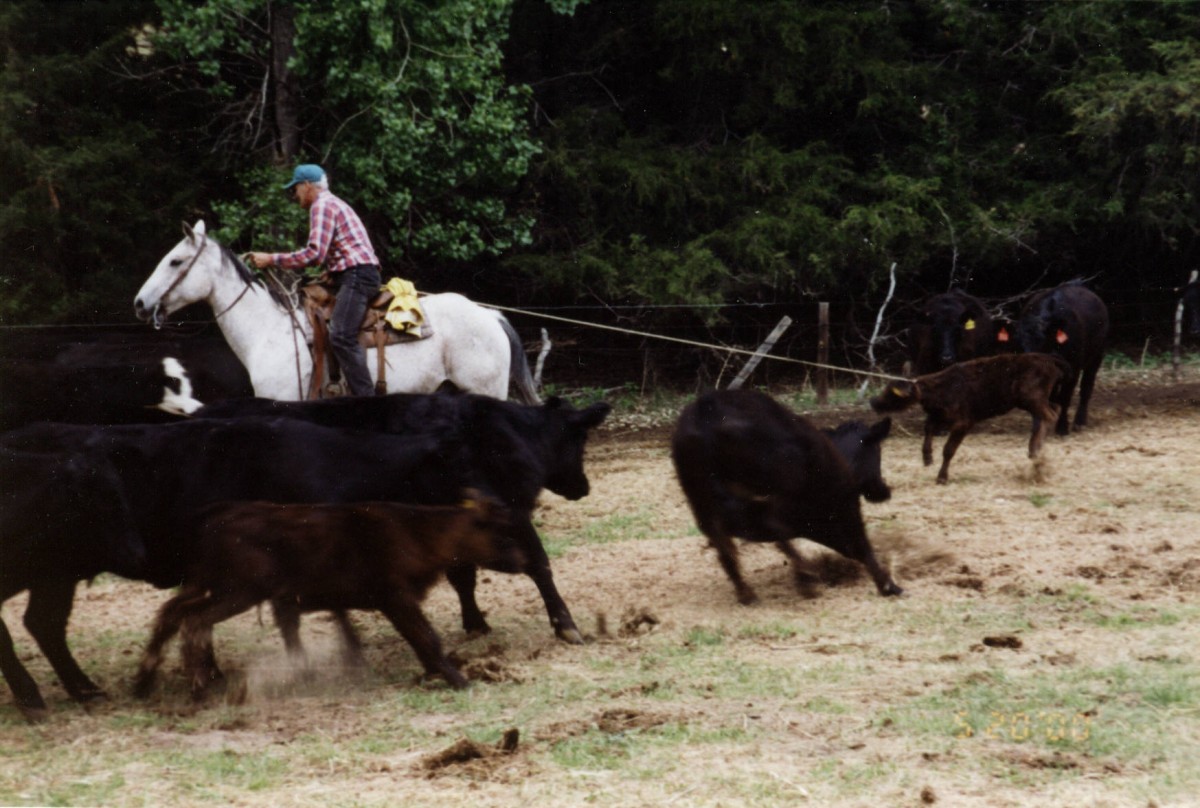 He had a huge work ethic. Loved to work cattle. Always wanted to go faster. You never had to use spurs or any urging with Rudy…most of the time you had to hold him back and then just release the reins when you wanted him to move. My dad loved riding him because he was so eager to work. I loved him because he was mine and we understood each other.
He had a huge work ethic. Loved to work cattle. Always wanted to go faster. You never had to use spurs or any urging with Rudy…most of the time you had to hold him back and then just release the reins when you wanted him to move. My dad loved riding him because he was so eager to work. I loved him because he was mine and we understood each other.
When I left for college, my dad was using him as his main cow horse on the ranch. I attended a small Christian college in a Chicago suburb, seemingly millions of miles from home. Four years later when I graduated, I took a teaching job in Iowa. I was short on money, so Dad bought Rudy from me. Then Dad sold the ranch in Nebraska and moved to Idaho. This year, Dad is retiring from ranching, so he gave away almost all of his horses. He brought Rudy back to Iowa for me.
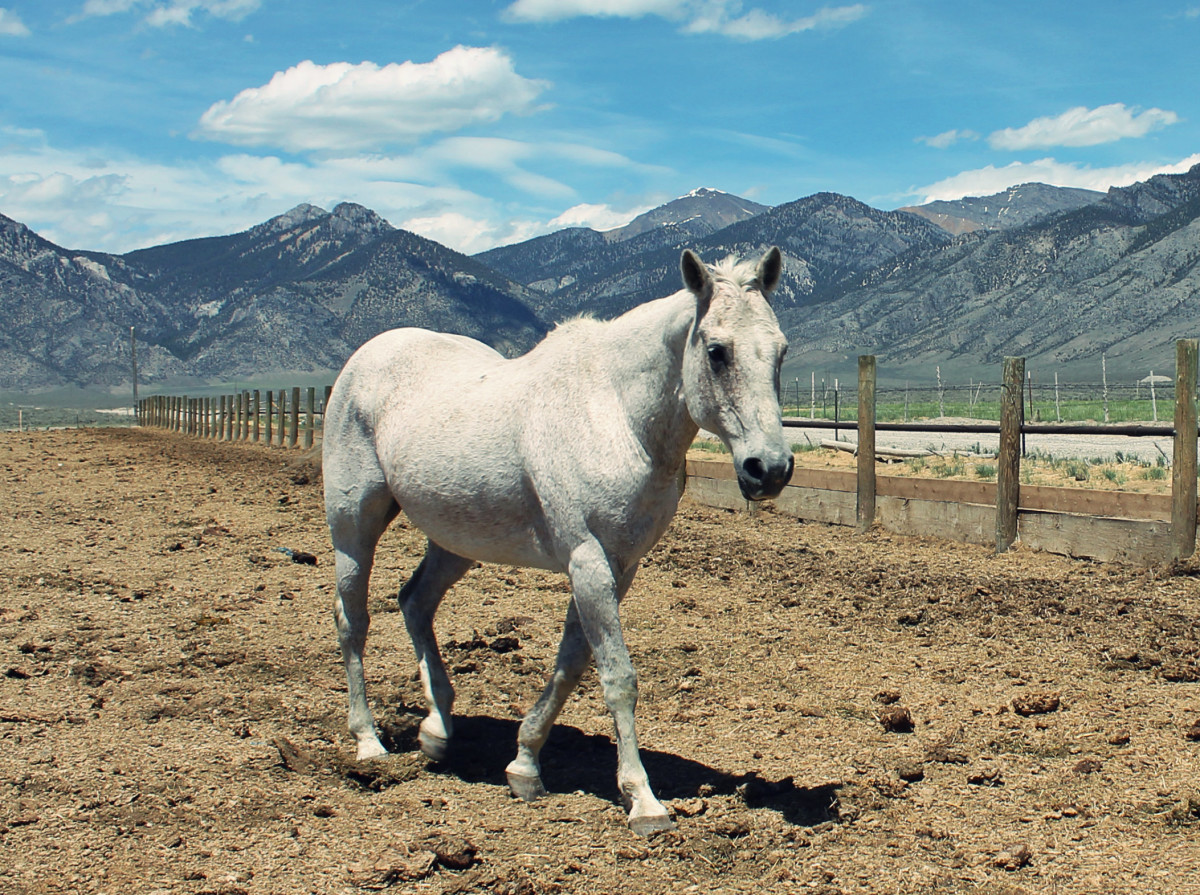 I was loving having him back. I bought him senior feed, small alfalfa bales, and kept him separate from my other horses so he wouldn’t get picked on. He and his buddy Red were doing great. When it got cold and started raining and snowing in November, I opened up the corn crib and sectioned off a stall so he could be inside if he wanted to. Red was spookier and liked being outside so he could look around for boogie men. Rudy liked to stand in the open door of his stall and watch Red being silly outside.
I was loving having him back. I bought him senior feed, small alfalfa bales, and kept him separate from my other horses so he wouldn’t get picked on. He and his buddy Red were doing great. When it got cold and started raining and snowing in November, I opened up the corn crib and sectioned off a stall so he could be inside if he wanted to. Red was spookier and liked being outside so he could look around for boogie men. Rudy liked to stand in the open door of his stall and watch Red being silly outside.
It got to be so he didn’t like leaving his stall. I could tell he hadn’t gone out to the tank in the corral for a drink because the corral was muddy from all the rain we were having, and Rudy’s hooves would be clean and dry. So I started carrying him buckets of water morning and night, so he wouldn’t need to go outside at all.
Then it was Christmas and we traveled to Tennessee to be with family for five days. We left the horses with a big round bale of alfalfa in an outdoor feeder and a full tank of water, with someone to check in on them daily. But when I got home, it was pretty clear that something wasn’t right. Rudy was in his stall but he was not interested in grain. Later that day, I saw him nipping at his sides. I called our local vet, who came out and looked at him and said he looked okay. He was just standing by the hay bale, not eating, ears back, but not kicking or nipping his belly. So the vet gave me a tube of Banamine, just in case he started doing it again, and left.
I gave Rudy a dose that night, because he was obviously colicking. That was Wednesday. At 8:05 on Thursday morning, New Year’s Eve, I called a horse vet an hour away, asking if I could bring Rudy in. They said if I made it there by nine o’clock, they could take a look at him, but they closed at noon and had a bunch of chute work to do at ten. It was almost 8:30 when I left the farm with Rudy in the trailer, and I made it to the vet’s by 9:15. I called them at nine to say I was on my way, but I’d never been to that town before and would be a little late.
The vet came out to meet me when I pulled in the drive, listened to Rudy’s breathing and belly sounds, and asked me some routine questions like if he’d been drinking and if he had salt available (he’d had a block we put out in the feed bunk in the corral, but the rain had washed most of it away, so he hadn’t had any in a couple of weeks). The vet said that especially during winter, salt is important for horses because it will prompt them to drink more. It could very well have been the reason for Rudy’s colic.
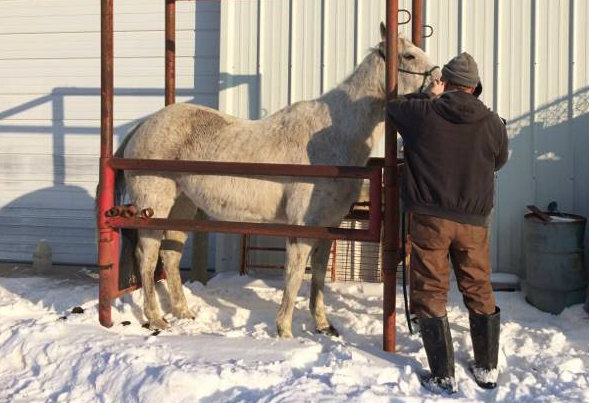 So the vet gave him an IV of Banamine, put a tube down his nose and flushed mineral oil into his stomach. He also pulled out as much of the intestinal blockage as he could reach, but he said there was more, further up, that was hardened and he could not reach it. He wrote on my receipt “mild colic”, and I left there very optimistic that Rudy would be okay and the oil would help get things back to normal again.
So the vet gave him an IV of Banamine, put a tube down his nose and flushed mineral oil into his stomach. He also pulled out as much of the intestinal blockage as he could reach, but he said there was more, further up, that was hardened and he could not reach it. He wrote on my receipt “mild colic”, and I left there very optimistic that Rudy would be okay and the oil would help get things back to normal again.
But there was no improvement the next day. No manure in the stall, no eating, and he’d only drink a few inches off the top of the buckets of water I carried him. I went through the other two doses of Banamine I had, and then went to town for more. It was Saturday when I called the vet who had treated Rudy and told him that I could hear stomach sounds easily (his stomach sounded like a thunderstorm), but he was not eating, and was very uncomfortable. He would paw all of his bedding in the stall into a ball under him and stand in it. His front hooves were getting worn down from all the pawing. I made an appointment for him at the vet for Monday morning and hoped there would be a change.
The only change was for the worse. Sunday morning I took him out for a walk because he was pawing and rolling and I didn’t know what else to do. He walked fine, followed me willingly, and took a good long drink from the tank when we got back. I checked him several times throughout the day, and he would lie down in the snow and then raise himself up on his front legs into a sitting position. I wondered if he was too weak to stand, but as I watched him I realized he was fully capable of getting up easily and quickly, it was not a lack of strength that was making him sit. He was trying to rub his tail end on the ground, hoping for some relief. I didn’t know if he would make it until morning. This is him, standing at the water tank that last Sunday morning.
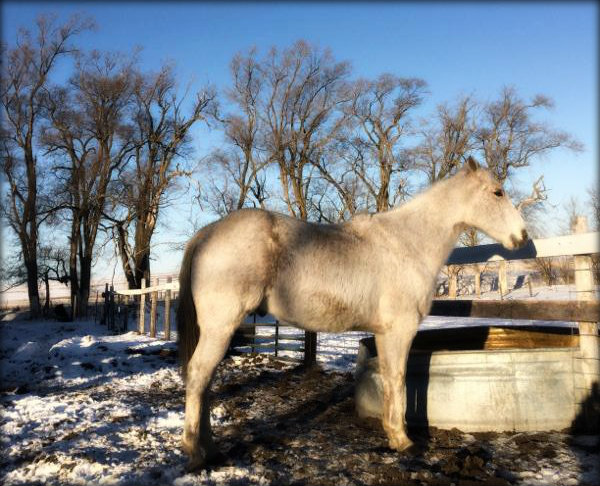 That night when I went out to do chores, there was blood coming from his tail end. I started crying and frantically called my local vet, whose wife said he was out and that I should probably call the vet who had treated Rudy. I called him then, and could barely tell him what was happening, I was crying so much. He said that the blood meant that something had ruptured and that Rudy was beyond helping. He offered to drive up, from an hour away, on a Sunday night, to put him down. I told him I could probably get someone local to do it.
That night when I went out to do chores, there was blood coming from his tail end. I started crying and frantically called my local vet, whose wife said he was out and that I should probably call the vet who had treated Rudy. I called him then, and could barely tell him what was happening, I was crying so much. He said that the blood meant that something had ruptured and that Rudy was beyond helping. He offered to drive up, from an hour away, on a Sunday night, to put him down. I told him I could probably get someone local to do it.
I went home and called a neighbor, who left his Sunday night supper to come out and put my horse down for me. I didn’t want Rudy to have to wait an hour for the vet, so I asked someone who I knew was very responsible to shoot him, quickly and painlessly. I led Rudy away from the barn, down through the field to the timber. He followed me so willingly, it made me cry all the harder, knowing that that horse would have followed me wherever I asked him to, without complaint, until he couldn’t walk anymore. I hated making him walk, but I couldn’t stand the thought of a tractor or loader dragging him to his final resting place. And I wanted to make that one last walk with Rudy, in the dark, through the snow, to the trees.
I found a perfectly straight little sapling close to the edge of the forest, and tied him there. I hugged him and told him he was the best horse in the world. He was so beautiful, standing there in the snow, even though his head was low and his eyes had lost interest. And then I went and sat in the neighbor’s pickup and listened for the sound of the shot.
It might seem incongruous, but that sound brought me peace. It was horrible losing him, but the most horrible part was seeing him in pain and not being able to help him. I went back the next day, before he was buried, so that I could get some of his tail hair to remember him by. I’m going to have a keepsake made from it. Some sort of tangible way to keep him here with me.
I am a tough old calloused soul who has lost three good horses by now, so I can get through this. I have learned that no matter how much you beat yourself up, it doesn’t make much difference, they’re still gone. I have come to be so grateful that I got to be a part of a life so great, so beautiful, so incredible….and that the pain itself is a testament to how big that love was.
Even the very best ones die. So treasure them. Love them. And maybe, someday, they’ll be there waiting for us again.


{ 1 comment }
Beautifully written. I am sorry for your loss.